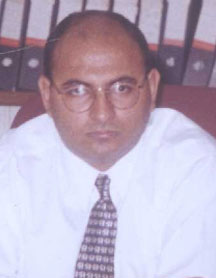Without stating the specifics, Chief Executive Office of National Industrial and Commercial Invest-ments Limited (NICIL) Winston Brassington said the Privatisation Board was satisfied that Queens Atlantic Investment Inc (QAII) has lived up to its obligations with regard to the Sanata site.
According to Brassington, who is also head of the Privatisation Unit, QAII had made meaningful investment and also succeeded in creating jobs at the facility, which had been left decrepit and had become a burden on the treasury.

But when quizzed on what QAII had satisfied, Brassington said that while he had checked on this, he wanted to run the answers by his Board of Directors before making them available to this newspaper. He said that a board meeting is to be convened sometime this month.
In an earlier comment to this newspaper some weeks ago, Brassington, without getting into specifics, said the criteria that were laid out in the lease of the former Sanata Textiles complex were met. He said that before the actual process of selling the property to QAII occurred it had to be approved by the Privatisation Board.
“Many of the members of the Privatisation Board themselves visited the location and observed the tremendous investment and transformation and the employment and had basically occurred,” he said.
Brassington said the option to buy was at no concessional price, but based on independent market valuation at the time QAII took over and only after a substantial level of development and investment had occurred.
“What has happened there is probably exemplary, looking at the impact of the investment and looking at the various commitments in what has been a difficult environment. There are many cases where we have leases with options to buy after there has been substantial development. Not only am I satisfied, but the Privatisation Board is [as well],” he said.
It was envisaged that QAII would have been making an overall investment of US$30 million and would have been creating 1,200 jobs of which 600 new permanent jobs would have become a reality by the end of 2008.
Then president Bharrat Jagdeo had said in 2008 that there were clawback provisions that could be activated should the group of companies not fulfil its obligations under the lease and investment agreement. A 99-year lease had been initially granted to QAII for the development of printing, dying and textile operations at the Sanata complex.
However the group eventually bought the complex in 2010.
CEO of QAII Dr Ranjisinghi Ramroop declined to speak when approached by this newspaper for confirmation as to whether the group had met all of the conditions of the investment agreement.
The government had invited tenders for the lease of the printing and dying facilities and the land at the Sanata Complex, Industrial Estate, Ruimveldt, however there was no response. Then Head of Go Invest Geoffrey Da Silva said publicly that government put to QAII that it should consider the Sanata complex for expansion beyond its Farm, East Bank Demerara premises. It was noted that the Eccles industrial estate did not have the space to accommodate the planned expansion. He said that at that time, QAII drew up a proposal of five different projects and the government was heartened that the investor was willing to take on the asbestos removal, saving the government millions. He explained that government was trying to avoid a situation where persons sent low tenders for warehouse use of the property. He said government had retained ownership of the facility.
The government maintained that the selection of QAII’s proposal for the lease of Sanata’s land and equipment was done in a transparent manner. According to government, the Privatisation Board had recommended to Cabinet that the company be granted a 99-year lease with the government for the use of the Industrial Estate facility.
Brassington in 2008 had said that once QAII came good with its US$30 million investment in the Sanata complex, it was free to exercise the option to buy the property at a price of $700 million after three years. Brassington had said that the price quoted was the average valuation between that which government obtained from an independent valuator and one contracted by the investors.
Government said that prior to the investment at Sanata, the annual upkeep costs in 2006 were almost $20 million: $8 million in security, $6 million in rates and taxes, and over $5 million in cleaning and miscellaneous repairs including perimeter lighting. While parts of the complex had been rented out on short term leases, the fees collected were never sufficient to cover the upkeep.
The privatisation of the entity started with an advertisement in the last quarter of 2006 for the former G&C Sanata operations but no bids were received on the extended closing date of February 28, 2007.
The tender, which had an original closing date of January 2007, was re-advertised over 20 times and the closing date extension to the end of February was to encourage interest from both local and overseas investors, Brassington had said.
Government had retroactively brought to the Parliament legislation to enable QAII to enjoy the benefits of the investment concessions when it was discovered that the company did not quality under the law at the time. An amendment was then enacted to the Income Tax (In Aid of Industry) Act to facilitate QAII benefiting from the concessions.








